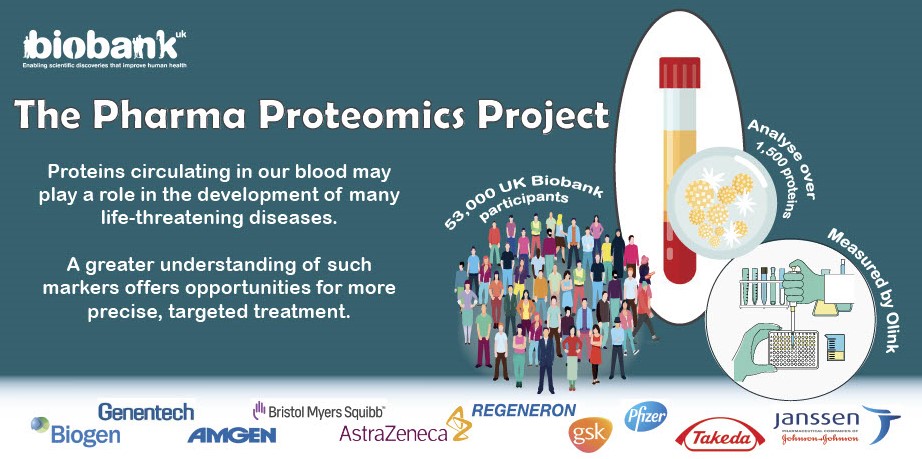UK Biobank launches one of the largest scientific studies
UK Biobank launches one of the largest scientific studies measuring circulating proteins, to better understand the link between genetics and human disease
The Pharma Proteomics Project, commissioned by a biopharmaceutical consortium, represents a major step forward in ‘proteomics’ and will further enhance the UK Biobank database and research resource.

London, 7 Dec 2020 – UK Biobank, one of the world’s largest and most comprehensive biomedical databases and research resources, announces today that a consortium of ten biopharmaceutical companies will perform a study to measure circulating concentrations of almost 1,500 plasma proteins in approximately 53,000 UK Biobank participants. It will be one of the world’s largest studies of blood protein concentrations conducted to date and aims to significantly enhance the field of ‘proteomics’, enabling better understanding of disease processes and supporting innovative drug development.
Over the last few years, UK Biobank has, with consent, made de-identified genetic data on its 500,000 participants available to scientists in order to identify potential DNA hotspots associated with human diseases. These genetic variants can serve as powerful ‘signposts’ for scientists in drug discovery and development. The measurement of a wide range of circulating proteins represents the next major step for UK Biobank, as these data will enable research into the association between genetic variation and circulating protein levels, which in turn, will help to understand the links between genetics and human disease. Studying the levels of many different proteins in UK Biobank participants will allow scientists to assess the extent to which particular proteins are involved in the development or progression of different diseases.
The study has been commissioned and funded by a consortium of leading biopharmaceutical companies including Amgen, AstraZeneca, Biogen, Bristol Myers Squibb, Genentech (a member of the Roche Group), GlaxoSmithKline (GSK), The Janssen Pharmaceutical Companies of Johnson & Johnson*, Pfizer Inc, Regeneron and Takeda Pharmaceutical Co. Ltd. The laboratory work to measure the proteins will be conducted by Olink, a leading Swedish proteomics company, using its proprietary technology, which combines high throughput and high-quality protein-level data from very small sample volumes.
The resulting de-identified dataset will be added to the UK Biobank research resource and, after an initial 9-month exclusivity period for the companies funding the assays, made available to all approved researchers. Its aim is to provide an extensive map of the levels of almost 1,500 proteins in the human body that have been traditionally difficult to identify and quantify, particularly at scale.
"Measuring protein levels in the blood is crucial to understanding the link between genetic factors and the development of common life-threatening diseases. With data on genetic, imaging, lifestyle factors and health outcomes over many years, this will be the largest proteomic study in the world to be shared as a global scientific resource. These combined data could enable researchers to make novel scientific discoveries about how circulating proteins influence our health, and to better understand the link between genetics and human disease."Professor Naomi Allen, Chief Scientist of UK Biobank
Notably, the dataset will include samples from about 1,500 UK Biobank participants who have evidence of previous infection with SARS-CoV-2 as well as 1,500 participants without such evidence, all of whom have undergone detailed whole body imaging. This particular element of the study has the potential to enhance our understanding of SARS-CoV-2 infection on both changes in internal organs and circulating protein levels, including proteins related to inflammation, which are thought to be of vital importance in the body’s response to SARS-CoV-2 infection.
Each consortium member plans to analyse the proteomic measurements to develop new insights into human health and disease. Their research will focus on the attempted discovery of novel associations among genetic variants, protein concentrations and traits of relevance to drug discovery and development, and to use those associations to identify potential new therapeutics, validate existing therapeutics, discover blood-based biomarkers for patient stratification and treatment response, and further develop medicines and diagnostics.
* Contract entered by Janssen Biotech, Inc.; collaboration facilitated by Johnson & Johnson Innovation
